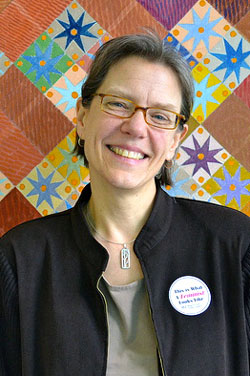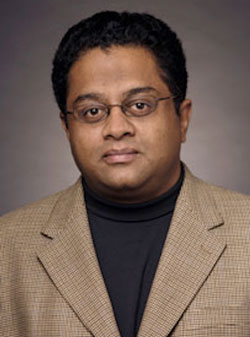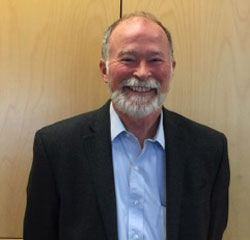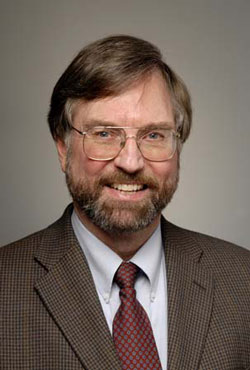
| Vol.
XXXI No.
3 January / February 2019 |
| contents |
| Printable Version |
Candidates for Upcoming Election to
Faculty Newsletter Editorial Board
The origin of the Faculty Newsletter (FNL) came out of the errors in governance surrounding the dissolution of the Department of Applied Biological Sciences (ABS), by then-Provost John Deutch. At the time (1988) of the dissolution of the ABS department, MIT faculty members preparing a petition calling for a reversal of the Administration’s actions had difficulty in circulating the draft broadly, due to the unwillingness of the Administration to make faculty mailing lists available. In addition, with the faculty meeting agenda set and the faculty meeting chaired by the President, fully open discussion was not easy. The FNL emerged as an effort to establish open lines of communication among faculty.
There was significant support for such a publication. The subsequent 30+ years of issues of the Newsletter after the “zeroth” issue can be found in the Newsletter archives. Initially the Newsletter was supported by contributions from individual faculty. It was a full nine years after these origins that President Vest formally agreed to support the publication costs and a salary for the managing editor of the Newsletter. This battle has had to be fought continually in the years following, as described in the article “The Saga of the Struggle for Survival of the Faculty Newsletter” in the March/April 2007 issue.
During the ensuing years, the Newsletter has provided a forum for expression of faculty concerns and views, a major channel of communication among the faculty, and a means for candid debate on difficult issues. The primary guiding principles have been to provide open access for faculty and emeritus faculty to express views on issues of concern through control of editorial policy by the faculty Editorial Board, independent of influence by the MIT Administration. Areas where the independence of the Newsletter have been important include the first public release, on our website, of the report on the “Status of Women Faculty at MIT”; the publication of the Special Edition Newsletter devoted to responses to the Report of the Task Force on the Undergraduate Educational Commons, to which more than 40 faculty contributed; exploration of health insurance, pension, and retirement issues; compacts with foreign governments; and minority recruitment and promotion.
Since its inception, the Newsletter has been maintained by a volunteer Editorial Board, over time involving more than 50 members of the faculty from all Schools of the Institute. Since 2008 we have followed a formal nomination and election process with direct election of Board members by an electorate of the full faculty and emeritus faculty.
The Newsletter has come to be widely read, not just at MIT but outside as well, through the online edition. The FNL website also can potentially serve as a forum for discussion of national and international issues. With the support and involvement of MIT’s faculty, the Newsletter will continue to play an important role at MIT and beyond.
Candidates for Election to Faculty Newsletter Editorial Board

Aron Bernstein is Professor of Physics Emeritus at MIT where he has been on the faculty since 1961. He has taught a broad range of physics courses from freshman to graduate level. His research program has been in nuclear and particle physics, with an emphasis on studying the basic symmetries of matter.
Since 1969 he has been active in the area of nuclear arms control. He initiated the Nuclear Weapons Education Project. In addition to supervising individual MIT undergraduate students his teaching has included seminars on the nuclear arms race with Jim Walsh of the MIT Political Science Department. He is a national board member of the Council for a Livable World.
Professor Bernstein is a fellow of the American Physical Society and the American Association of Scientists. He has been awarded John Simon Guggenheim and Humboldt Senior Research Fellowships.

Sally Haslanger is Ford Professor of Philosophy and Women's and Gender Studies at MIT. Broadly speaking, her work links issues of social justice with contemporary work in epistemology, metaphysics, and philosophy of language and mind. Recently she has been working on social structural explanation with an emphasis on the materiality of social practices and the role of ideology. She is a member of the American Academy of Arts and Sciences and holds a Guggenheim in 2018-19.
In addition to her research on social justice, Haslanger has been deeply committed to promoting diversity in philosophy and beyond. She was the founder and convener of the Women in Philosophy Task Force, and co-founded PIKSI-Boston, a summer philosophy institute for undergraduates from underrepresented groups, held at MIT. Since coming to MIT in 1998, she has served as Director of Women's and Gender Studies (2009-2013) and has been a member of the Campus Committee on Race Relations (now Committee on Race and Diversity) and the Council on Work and Family; she currently serves on the Committee on Sexual Misconduct Prevention and Response and the Day of Action organizing team. She was awarded the YWCA Cambridge Tribute to Outstanding Women in 2011 and the Martin Luther King, Jr. Leadership Award at MIT in 2014.
Haslanger has taught at six institutions of higher education, several of them being public universities. In her view, MIT's administrative structure does not provide adequate mechanisms for genuine and independent faculty governance or oversight of institutional decisions. It is essential that the faculty have a strong voice in determining the future of MIT. The MIT Faculty Newsletter has been an invaluable source of information, debate, and critique and must continue to call attention to the challenges and opportunities we face. It is our responsibility, as a faculty, to lead MIT, and in order to do so, we must have open and engaged discussion. The MIT Faculty Newsletter is our best resource for undertaking this important work.

Seth Lloyd is Nam P. Suh professor of mechanical engineering and professor of physics at MIT. Dr. Lloyd's research focuses on problems on information and complexity in the universe. He was the first person to develop a realizable model for quantum computation and is working with a variety of groups to construct and operate quantum computers and quantum communication systems. Dr. Lloyd has worked to establish fundamental physical limits to precision measurement and to develop algorithms for quantum computers for pattern recognition and machine learning. Dr. Lloyd's work on complex systems currently focuses transitions between stability and instability in complex dynamical systems.
He is author of more than 200 scientific papers, and of Programming the Universe (Knopf, 2004).

Ceasar L. McDowell is Professor of the Practice of Civic Design at MIT. His current work is on the design of civic infrastructures and processes to connect the increasingly demographically complex public. In the Department of Urban Studies and Planning (DUSP), Ceasar teaches on civic and community engagement and the use of social media to enhance both. Ceasar brings his deep commitment to the work of building beloved, just and equitable communities that are able to – as his friend Carl Moore says – “struggle with the traditions that bind them and the interests that separate them so they can build a future that is an improvement on the past.”
Ceasar is the founder of MIT’s CO-Lab and the new Civic Design Network and co-initiator of America’s Path Forward. He is currently working on a podcast series, The Move, and on civic design. Outside of MIT Ceasar works with organizations ranging from Massport and the Kendall Square Association to the Obama Foundation and Beyond Conflict on community engagement and civic leadership.
Dr. McDowell served as Director of the global civic engagement organization Dropping Knowledge International, President of Interaction Institute for Social Change, co-founder of The Civil Rights Forum on Telecommunications Policy, and founding Board member of The Algebra Project. Engagement Projects include GoBoston 2030, Springfield Northend Campaign, 21Days, Cambridge, MA and Global Table of Free Voice, Berlin.
The MIT Faculty Newsletter is an essential instrument of academic freedom and faculty voice at MIT. I have had the opportunity to contribute several articles to the Newsletter. My pieces have tended to represent progressive views. The beauty of the Newsletter is that it can hold the complexity of the views and opinions held by MIT faculty. If selected for the Editorial Board I would work to engage the younger new faculty to see the Newsletter as their forum.

Balakrishnan Rajagopal is currently a Professor of Law and Development and Head of the International Development Group in the Department of Urban Studies and Planning at MIT. He is currently a Counsellor to the American Society of International Law, and has served in the past for many years with the United Nations. He is the author of two books and many articles and chapters, and maintains a strong interest in communicating with the public through media. His research interests include legal and human rights dimensions of economic development and globalization as well as the law and politics of social mobilization.
He has been an avid reader of the Faculty Newsletter for many years and has strongly admired it as a space for independent and objective views from the faculty, and which fosters the conditions necessary for academic freedom. If elected, he would be honored to join his many distinguished colleagues to uphold the highest values of MIT in serving the Newsletter as a space for equity, balance, and responsibility.

Robert Redwine has been on the MIT faculty since 1979. His research area is experimental nuclear physics and he served as Director of the Laboratory for Nuclear Science from 1992 to 2000 and as Director of the Bates Laboratory from 2006 to 2018. He also has strong interests in education and served as Dean for Undergraduate Education from 2000 to 2006.
During much of the last decade he has been the faculty lead for 8.02, which is, of course, one of the General Institute Requirements for all undergraduates and which is now taught in an active learning format. He believes that the Faculty Newsletter is a valuable voice for faculty members in general and that it has played an important role in providing the faculty a platform that is different in critical ways from departments and standing committees.

I am fascinated by the workings of this extraordinary place. I believe that the Institute operates well because our colleagues, at all levels, when deciding what should be done, become informed and then employ exceptional reasoning skills to the processes of making decisions and executing plans. The Faculty Newsletter should serve as an enabler of such informed decision-making.
In the next few years we will have a remarkable opportunity to reconfigure the Institute particularly with regard to computing, our infrastructure, the student experience, Kendall Square, and the choices that we make in understanding and engaging the world. I see the FNL as informing the consideration of options as we decide what we should “do with all this future.”
My research interests are in engineering design and product development. A personal interest has been the study of career paths that our students take. As a faculty member in the Mechanical Engineering Department for many years, I’ve served on numerous departmental, School, and Institute committees and have developed some appreciation for the ways that MIT plans and executes. If chosen for the FNL Editorial Board, I would work to bring to our community information and ideas to inform our perspectives as we engage in inventing and inhabiting the Institute’s future.
| Back to top | |
| Send your comments |
| home this issue archives editorial board contact us faculty website |